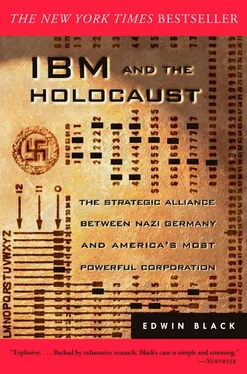Watson did everything he could to reinforce in Germany his image of special American potency and friendship. The German consul in New York was a houseguest at Watson’s home, and Watson insisted on arranging for him complimentary country club privileges at the IBM Country Club. His socializing with the German Ambassador was equally robust, making certain that special invitations for luncheons and dinners were regularly circulated to German diplomats, and punctual acceptance or gracious regrets were sent in response to theirs. 76
So a happy medium was found between Watson’s desire to maintain deniability in IBM’s lucrative relations with Germany and his personal desire to hobnob with Third Reich VIPs. But, the demands of the growing business in Germany would not be free of Watson’s famous micro-management. Too much was at stake.
Watson would travel to Germany regularly during the thirties for firsthand information about the situation in the Nazi Reich. These visits would be augmented by his personal New York representatives who would monitor Dehomag on-site for months at a time. Verbatim translations of Dehomag’s voluminous memos, correspondence, even routine bureaucratic forms and applications, were continuously transmitted to IBM in New York for review and comment.
Watson had created the IBM Europe office, headquartering it in Paris and then Geneva, to function as the eyes and ears of the New York office in Europe. When Watson’s personal representatives were not in Germany, continuous supervision of Dehomag was effected by executives in the Swiss branch of IBM, and often the Paris office. More than just routine oversight of the German operation, the Swiss office of IBM would become the all- important nexus for instructions, profit funneling, and continent-wide coordination in support of Dehomag’s technologic activities throughout Europe. The combination of Watson’s micro-management from afar and persistent Swiss examination gave IBM an ever-present hour-to-hour grasp of the small est operational details at Dehomag, from miniscule bank discrepancies amounting to just a few dollars to the most vital issues facing the subsidiary’s relations with the Nazi regime.
From the very first moments and continuing throughout the twelve-year existence of the Third Reich, IBM placed its technology at the disposal of Hitler’s program of Jewish destruction and territorial domination. IBM did not invent Germany’s anti-Semitism, but when it volunteered solutions, the company virtually braided with Nazism. Like any technologic evolution, each new solution powered a new level of sinister expectation and cruel capability.
When Germany wanted to identify the Jews by name, IBM showed them how. When Germany wanted to use that information to launch programs of social expulsion and expropriation, IBM provided the technologic wherewithal. When the trains needed to run on time, from city to city or between concentration camps, IBM offered that solution as well. Ultimately, there was no solution IBM would not devise for a Reich willing to pay for services rendered. One solution led to another. No solution was out of the question.
As the clock ticked, as the punch cards clicked, as Jews in Germany saw their existence vaporizing, others saw their corporate fortunes rise. Even as German Jewry hid in their homes and wept in despair, even as the world quietly trembled in fear, there was singing. Exhilarated, mesmerized, the faithful would sing, and sing loudly to their Leaders—on both sides of the Atlantic.
Some uniforms were brown. Some were blue.
IV. THE IBM — NAZI ALLIANCE
WILLY HEIDINGER HATED THOMAS WATSON. BITTER ANDdefiant, Heidinger saw Watson as the incarnation of the financial calamity that had befallen Germany after the Great War. Heidinger had possessed the vision in 1910 to introduce Hollerith’s contraption into Germany. He founded a company, Dehomag, to bring data processing to his country. But for the monetary manipulations that arose after World War I, the Diktat of the Versailles Treaty, and the wild ensuing hyperinflation of the twenties, Heidinger would still own that company. 1
Back in 1922, worthless German currency was devalued by the hour. Heidinger was unable to remit some $104,000 in royalties to CTR, the IBM predecessor company, because it amounted to trillions of inflated Reichsmarks that were impossible to obtain. Wat son seized upon Germany’s inflation crisis to take possession of Dehomag. During contentious negotiations, Watson first offered to demur on the royalty debt in exchange for 51 percent of the company. Heidinger felt it was better to own nearly half of a going concern than all of a bankrupt one. So he agreed to yield half of Dehomag. But then Watson abruptly upped the demand from 51 per cent of Dehomag to 90 percent. Heidinger felt “cornered” by his own private Diktat. Under Watson’s new terms, Heidinger would own 10 percent—or nothing. Watson had outmaneuvered Heidinger. 2
It was more than a decade earlier. But Heidinger never forgot it. He spent the rest of his career biting back.
Watson, on the other hand, was a steel-nerved businessman. He saw the Dehomag takeover of 1922 as just another opportunity to swoop up a lucrative business for virtually nothing. What could be more natural? Hating a business contact was of no use to a man like Watson. Heidinger merely represented a factor to control in the pursuit of profits.
But Heidinger was woven from too much feisty fabric. His austere face pulled tight over high cheekbones beneath a worried brow framed the very picture of contentiousness. “I would be the last to submit to domination,” Heidinger wrote to IBM’s Nazi oversight panel in recalling his dislike for Watson. “I do not, as a matter of principle, let anyone tell me to do anything.” 3
Warlike in his business demeanor, Heidinger enjoyed corporate combat and tenacious lawsuits. He could litigate a narrow commercial issue for years and obstruct a crucial company program at the eleventh hour unless he received his due. Like Hollerith himself, Heidinger was willing to battle colleagues as well as adversaries. An IBM assessment of Heidinger termed him a “hardened survivor” whose “life… was not a serene one.” The description added, “He throve on fights.” 4
More than just volatile and unpredictable, no one at IBM trusted Heidinger. Company executives constantly suspected him of chiseling IBM for small and large sums, and thwarting their routine audits to identify the amounts. “Mr. Heidinger is a very selfish man,” wrote one IBM auditor who in spring 1934 tried to verify Dehomag’s tax information. At about that time, another IBM auditor in Paris reported back to the New York office, “Just in order to avoid any misunderstanding, we wish to advise that we are not aware of what is taking place… insofar as the recording of the inventories and the closing of the books is concerned.” The company’s staid blue-suited accountants learned to be reluctant in approaching Heidinger less they incur his volcanic temper. In that vein, another auditor, also writing in spring 1934, complained, “it is practically impossible to do anything by correspondence, due to the fear of unduly exciting our German friends.” 5
Even before Hitler seized power, IBM had profited enormously from Dehomag. By 1927, profits had returned more than 400 percent of IBM’s purchase price. 6Now, as part of the Third Reich’s industrial team, Dehomag’s future was catapulting. Nazi demands for a universe of punch card applications promised horizonless profits. Merged IBM entities, a Europe-wide territory, and a new factory presaged a magnificent new Dehomag whose fortune would rise along with the fortune of the Third Reich. Yet who would prosper? Would it be the German people? the Aryan race? Heidinger personally? No. It would be Watson and IBM. Heidinger roiled at the prospect.
Читать дальше












